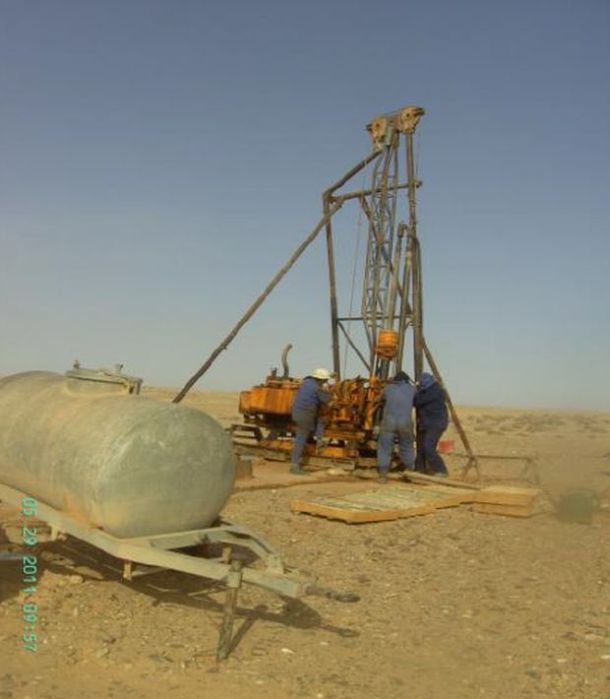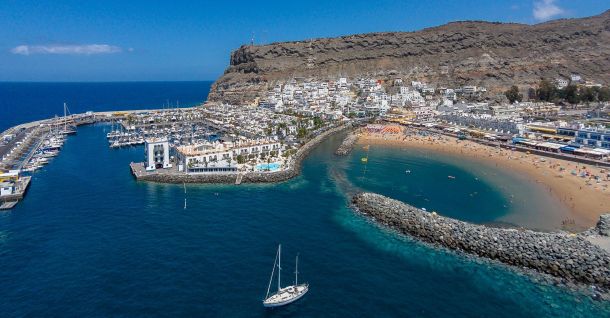
Tourist beaches on the Canary Islands are made with sand from occupied Western Sahara.
Bulk vessels fully loaded with fine sand cross back and forth between the occupied territory of Western Sahara and the Canary Islands. When arriving at the Spanich archipelago, their cargoes are loaded onto waiting trucks, and then transported to the islands' tourist beaches. The video above shows the remaking of the Mogán beach on Gran Canary in December 2019. Sand is also used for the local construction industry. In 2025, WSRW released an extensive report detailing the sand trade and the key players involved.
WSRW has written about such shipments to Tenerife and Mallorca in 2017, and to Madeira on two occasions in 2008.

The first known exports of sand from Western Sahara to the Canaries took place in 1955, at the time when the territory was regarded as a Spanish province. The beach - Las Teresitas on Gran Canary - was later remade from 1971 through to 1973, and had further grooming and construction work done over the course of the years. 140.000 cubic meters of sand were exported from Western Sahara in 1998. WSRW started monitoring the practice around 2008.

For some years now, the Moroccan state-owned oil and mines company ONHYM has shown an interest for precious metals onshore. Although no production is currently taking place, documents released by the company show exploration of for instance uranium, diamonds, gold and niobium.
In 2021, Morocco started excavating for mineral exploration in the southern part of the territory.
WSRW has covered ONHYM's uranium exploration in 2012, 2011 and 2010. The Romanian exploration company Prospectiuni has been involved in this research. The firm's vehicles were first observed near Dakhla in 2006. In 2014, WSRW received images of what appears to be small-scale mining of quartz.
The company with the longest track record in onshore exploration is Canadian firm Metalex.
WSRW first wrote about Morocco's iron exploration in Western Sahara in 2008.
Several airborne studies have also been commissioned by ONHYM, for instance by the Canadian companies Goldak in 2012 and Sander Geophysics in approx 2005, as well as by Fugro Airborne Surveys in the 1990s.

Until around 2017, salt was exported from Western Sahara to Europe for de-icing winter roads. The production site is at Oum Dbaa, at 27°29'44"N, 13°2'39"W. The end-users were primarily European municipalities. Since 2017, from what WSRW understands, the production has stopped, while the facility and its equipment remains at the site, watched by security personnel.
In 2014, WSRW reported that the Norwegian government-owned road services company Mesta had refused a deal to puchase such salt. "Based on the information we were given we chose not to pursue the deal with Crystal Mountain, because of the violations of human rights in the territory", the company explained. “Our priority is to have serious suppliers that base their work on ethics and human rights”, the firm stated.
In 2017, the Danish company Dansk Vejsalt followed the same practice, in order to avoid "trouble with regard to our de-icing salt.” This position came after several Danish municipalities stopped such purchases from Dansk Vejsalt. In that same year, WSRW documented transports of salt to Netherlands and France.
Since you're here....
WSRW’s work is being read and used more than ever. We work totally independently and to a large extent voluntarily. Our work takes time, dedication and diligence. But we do it because we believe it matters – and we hope you do too. We look for more monthly donors to support our work. If you'd like to contribute to our work – 3€, 5€, 8€ monthly… what you can spare – the future of WSRW would be much more secure. You can set up a monthly donation to WSRW quickly here.
Brazilian cement giant Votorantim behind sand plunder
WSRW was present as the Brazilian company Votorantim last week received a cargo of sand from occupied Western Sahara in Tenerife, Spain.
Conflict beach taking shape in Canary Islands
The construction work on the controversial beach of Mogán in Gran Canary started 2 December.
Conflict sand to cover Canary beach
The bay of Mogán at Gran Canary Island will next week be covered in conflict sand from occupied Western Sahara.
Caught fishing illegally in occupied Western Sahara
Several EU-flagged vessels have blatantly ignored and violated the EU Court judgment invalidating the EU-Morocco fish agreement in Western Sahara. Here they are.


